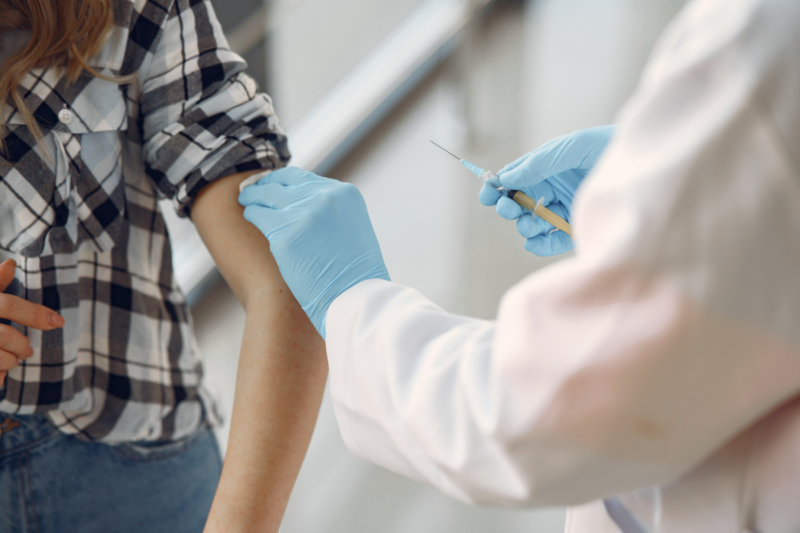The state government today announced “guiding principles” for how it would allocate vaccines for COVID-19 as they become available, with priority given to frontline health workers and vulnerable populations.
The guidelines follow news that three pharmaceutical companies established vaccines with a purported 70-95% efficacy against the virus during clinical trials held over the past few months.
Vaccination in Texas will be voluntary, but officials still expect to lack adequate supplies of the vaccine when they first become available. In order to make decisions about where to direct the limited supplies, the state health department established an Expert Vaccine Allocation Panel (EVAP), which will make recommendations for approval by the state health commissioner.
According to a joint announcement today by the state health department and the governor’s office, the Vaccine Allocation Panel determined that Texas initially will allocate COVID-19 vaccines based on the following criteria:
Protecting health care workers who fill a critical role in caring for and preserving the lives of COVID-19 patients and maintaining the health care infrastructure for all who need it.
Protecting frontline workers who are at greater risk of contracting COVID-19 due to the nature of their work providing critical services and preserving the economy.
Protecting vulnerable populations who are at greater risk of severe disease and death if they contract COVID-19.
Mitigating health inequities due to factors such as demographics, poverty, insurance status and geography.
Data-driven allocations using the best available scientific evidence and epidemiology at the time, allowing for flexibility for local conditions.
Geographic diversity through a balanced approach that considers access in urban and rural communities and in affected ZIP codes.
Transparency through sharing allocations with the public and seeking public feedback.
The guiding principles announced today don’t define “vulnerable population.” However, an October draft of the state’s vaccination plan said that the term may include long-term care facility residents, people with underlying medical conditions, racial minorities, people with disabilities, the homeless, the incarcerated, and people 65 years of age and older.
It’s not clear which groups among that list would be given first priority. The October report stated, “Prioritization will be based on some combination of job functions, exposure potential (i.e., hospital patient care workers, EMS, nursing homes), and individual risk factors for severe illness or poor outcomes.”
In all, there are an estimated 3.9 million Texans who are 65 years old and up, 137,851 nursing home residents, 327,282 acute care hospital employees, and 66,033 EMS, according to the draft vaccine plan.
The draft vaccination plan stated, “Individuals are not required by the state to receive the vaccine.”
Today’s press release stated that the state’s initial distribution for COVID-19 vaccines is expected as early as next month. It says, “As part of its ongoing work, (the panel) will make recommendations on how and when to roll out vaccine to other critical groups.”
The Texas COVID-19 Expert Vaccine Allocation Panel consists of the following members:
- Chair, Imelda Garcia, Associate Commissioner for Laboratory and Infectious Disease Services, DSHS
- Sen. Lois Kolkhorst, Texas Senate District 18
- Sen. Eddie Lucio, Jr., Texas Senate District 27
- Rep. Stephanie Klick, Texas House District 91
- Rep. Senfronia Thompson, Texas House District 141
- David Lakey, M.D., Vice Chancellor for Health Affairs and Chief Medical Officer, University of Texas System
- Gerald Parker, M.D., Associate Dean, College of Veterinary Medicine & Biomedical Sciences, Texas A&M University
- John Zerwas, M.D., Executive Vice Chancellor for Health Affairs, University of Texas System
- W. Nim Kidd, Chief, Texas Division of Emergency Management, Texas A&M System
- Stephen Williams, MPA, Director, Houston Health Department
- Casie Stoughton,RN, MPH, Director of Public Health, City of Amarillo
- Paul McGaha D.O., MPH, Local Health Authority, Smith County, The University of Texas Health Science Center at Tyler
- David Gruber, Associate Commissioner for Regional and Local Health Operations, DSHS
- Manda Hall, M.D., Associate Commissioner for Community Health Improvement, DSHS
- Stephen Pont, M.D., State Epidemiologist, DSHS
- Jennifer Shuford, M.D., Infectious Disease Medical Officer, DSHS
- Ryan Van Ramshorst, M.D., MPD, Chief Medical Officer, Medicaid and Children’s Health Insurance Program, Health and Human Services Commission
